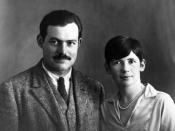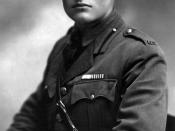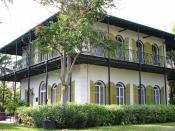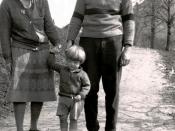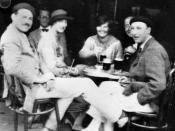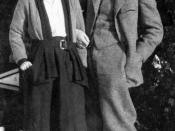Ernest Hemingway's dire need for escape was characteristic of most modern authors, although he may have taken it to the extreme. Modernists express an interest in escaping the abruptly changing and even depressing nature of the modern world. The topic of social breakdown or the loss of confidence in society's foundation is a reoccurring theme. Marriage, with examples from Hemingway's love life, is a prime exaple. Hemingway was a man of adventure, which led to the destruction of all of his marriages. His constant urge to escape from the constrictions of modern life may have been significant as well. Hemingway was eager to go to war; loved drinking, women, hunting, and gambling. These activities can easily be associated with the escape from ordinary life, and Hemingway was one of the few authors to radically act out on his views. Maybe the most radical action being a self inflicted gunshot wound, where he departed from the constrictions of life at age 61.
Hemingway's first marriage was to a woman by the name of Elizabeth Hadley Richardson. He met her at a friend's apartment and they went on to get married just a short time later. They lived frugally in a depressing apartment, surviving off of her trust fund. Hemingway escaped from his job by quitting, but occasionally sent in articles to the Toronto Star. Hemingway, with his powerful need to experience and see the world, destroyed his marriage. He demanded that he go to Constantinople to cover the war between Greece and Turkey. Hadley, as his wife was called, was furious about this proposition. Ernest brought her back exotic necklaces of ivory, which made things a little better. Next, he and his wife went to Spain where they witnessed amazing bullfights and the famous running of the bulls. This trip inspired his novel The Sun Also Rises. Hemingway gave up journalism after he fell in love with the novel, and the two moved back to Paris with their newly born son. Five years into the marriage, Hadley separated from Hemingway after she found out about an affair he was having with an editor of Vogue magazine, Pauline Pfeiffer. Ernest Hemingway let his sense of escape and adventure get the best of him, and it cost him his first wife and family.
Hadley had insisted that in order for Hemingway to gain a divorce from her, Hemingway and Pauline Pfeiffer were to live apart for six months and if, after that time they were still in love, she would give him a divorce. While enduring this six-month period, Hemingway became depressed and felt guilty. To escape from the pain he was going through he wrote Pauline telling her he was planning on taking his life because "it would be better for both of them if he simply died and went to hell"ÃÂ. Soon after he and Pauline were married. Hemingway injured his foot during their honeymoon in Grau-du-Roi, a small fishing port in France and was unable to write. He went into depression again. The couple had two children and settled in Key West, where Hemingway felt in paradise. His father then killed himself. This is when Hemingway began to escape again by going on exotic fishing expeditions. His need to get away got him fiercely ill when he acquired bronchial pneumonia after a sixty-five day fishing trip. After that he went on an African Safari with Pauline and got dysentery and had a prolapse of the lower intestine. His obsession with adventure soon cost him another marriage however. He bought a boat and left for months to go on fishing expeditions with his buddies, leaving his wife at home alone with their children. Hemingway strayed away again by having an affair with a journalist by the name of Martha Gelhorn. Pauline separated from Hemingway, leaving him depressed and guilt stricken once again.
Martha Gelhorn had a career of her own, and Hemingway could not deal with this. He stayed in Cuba, while Martha worked in England. He spent most of his time on a quest to destroy German submarines, driving all day in his boat searching. He even set up a secret organization in order to get rid of any possible Pro-Nazi in Cuba. This bizarre behavior was not taking him anywhere. Martha begged him to come to London, and he did. As soon as he got to London Hemingway fell in love with another woman named Mary Welsh. Hemingway then went to cover the war. He became so involved with the actual fighting of the war that he only continued to cover the war in order to stay on the front lines. He soon moved to Paris with Mary and the marriage between he and Martha Gelhorn was over. Hemingway and his mysterious off the wall activities drastically changed his life once again. He fell into a period of sever alcohol abuse due to the reoccurring feelings of guilt, escaping once again.
His marriage to Mary Welsh was a blurry mess, as those were the last days of his life. He didn't travel as much during this time, for his only adventures and escapes were in a bottle. Alcohol began to be his only driving force. Hemingway transformed from an adventurous soul into an accident prone drunk. He got into his third serious car accident, crashed two planes, and wrecked another marriage. He was showing signs of mental illness, relied even more heavily on alcohol, and eventually was checked into the Mayo clinic. His memory was gone, his wives were gone, and his soul was gone. Hemingway tripped the trigger of his double barrel shotgun and took his life, the most permanent escape of all from this world.
Hemingway chose to deal with life by getting away from it all by keeping himself busy with adventures, odd obsessions with politics, women, and alcohol. Hemingway took it to the extreme, for example, with his bizarre Nazi submarine watching. While doing all of this escaping he lost family, friends, and all four of his wives. The idea of life being meaningless, and a need to move on to a better place was a relatively apparent theme in not only his works, but in his life as well. The fact that he basically abandoned his wives and children everytime that he found a new woman to soothe this need for escape or change is just plainly out of touch with reality, and unusual. He obviously had a problem with facing reality, or conforming. Hemingway took the views of the literary period to an extreme. However, he was quite possibly the most influencial and famous of his time.
